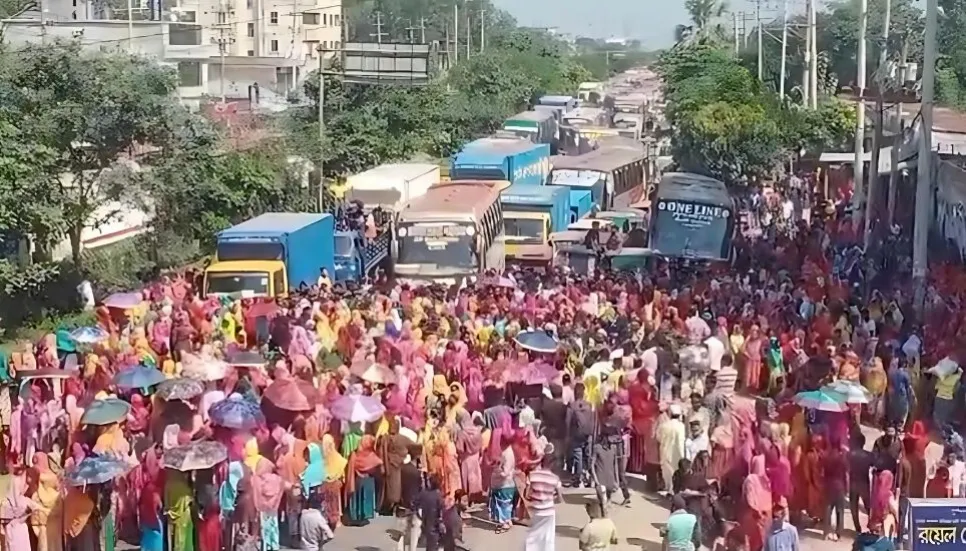
Tension among apparel exporters rose again on Sunday after a group of readymade garment workers took to the street with a new demand, Tk 25,000 as monthly salary, and observed work abstention in Ashulia, on the outskirts of capital Dhaka.
According to industrial police and Bangladesh Garment Manufacturers and Exporters Association (BGMEA), workers of Knit Asia Ltd, Dekko Group, Envoy Garments Ltd, Vintage Garments Ltd, NASSA Group and Setara Group in the Ashulia area came to the factories on Sunday morning and later started demonstrating on the street demanding the wage hike.
As a result, later in the day, 13 factories were closed with ‘no work, no pay’ policy under the labour act’s Section 13/1, and another 14 were forced to suspend production following the unrest.
The garment workers, however, did not vandalise any factories, and law enforcement agencies later convinced them to clear the road.
Labour and Employment Ministry Adviser Asif Mahmud Shojib Bhuyain met with the workers' representatives on Sunday to improve the situation and scheduled a meeting with RMG exporters for Monday at his office in the secretariat.
“We have to wait till Monday to take any further decision,” BGMEA President President Khandoker Rafiqul Islam told The Business Post.
Earlier on Saturday, the BGMEA board members decided to reopen all factories after receiving assurance from the workers’ leaders. However, as unrest continues on Sunday, the BGMEA members withdraw their decision to reopen the factories.
Industry insiders expressed concern as many workers started protesting again with a new issue, despite the fact that almost all of their previous demands have been met, with the remaining ones still in progress.
Industry insiders report that buyers have already shifted around 20 per cent of their orders to Bangladesh’s competitor countries, such as India, Pakistan, and Sri Lanka, and are now hesitant about placing new orders in Bangladesh.
“Amid the situation workers took place in the street with a new demand, which already settled by the government in last year, when the government hiked 56 per cent wages as per the law,” said BGMEA Director Md Ashikur Rahman Tuhin.
He further said, “There is two notable points. First, the unstable situation is limited only Ashulia area’s specific factories, and second is they are placing demands phase by phase. When we settled one issue, they raised a new one. This is questionable, and notable that a few number of workers are doing this.
“We, every citizen should protect the sector as this is our economy’s lifeline. If we lost buyers confident, they will shift to our competitive countries. In that case, where we and our workers will go?”
According to the BGMEA, the labour protests began on August 19 at the Dhaka’s EPZ gate, where a vested group started demonstrations which later spread to nearby factories. Initially, the impact was minimal, but the situation has since escalated, the trade body claimed.
Industry insiders, workers and law enforcement sources reported that on August 31, some 10,000 workers from the NASSA Group began vandalising factories.
NASSA Group workers also vandalised several other factories after owners and workers refused to halt production. Since then, the affected areas have witnessed continued labour unrest and frequent factory closures.
It is worth notable that NASSA Group Chairman Nazrul Islam Mazumder was closely tied with ousted prime minister Sheikh Hasina. Recently, Bangladesh Bank dissolved the board of EXIM Bank, where Mazumder also served as chairman, citing financial irregularities. Concerns have been raised regarding his alleged involvement in deliberate attempts to incite disorder.
BGMEA leaders, law enforcement agencies and government officials have accused followers of ousted Hasina and Indian agencies of inciting the protests to create unrest.
To control the situation, the interim government has deployed the Bangladesh Army across the country, excluding metropolitan areas, with magistracy powers. All commissioned officers of the military have been authorised to exercise their magistracy powers to manage any form of disorder.